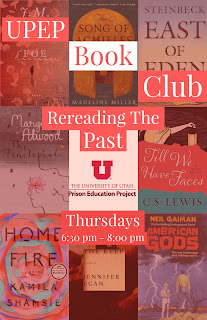 We rounded out "Rereading the Past" tonight with our discussion of
Jennifer Egan's "The Keep." This was a great discussion and a wonderful
note to end on. The first thing to be brought up was how Jennifer Egan
leaves so many loose ends open by the end of the novel...and it doesn't
matter! She somehow makes it work. Usually that kind of move would be
frustrating, but the fact that there is so much to be interpreted or
imagined adds to the genius of the novel. The readers loved the ending.
The symbolism of baptism and starting anew was not lost on anyone.
We rounded out "Rereading the Past" tonight with our discussion of
Jennifer Egan's "The Keep." This was a great discussion and a wonderful
note to end on. The first thing to be brought up was how Jennifer Egan
leaves so many loose ends open by the end of the novel...and it doesn't
matter! She somehow makes it work. Usually that kind of move would be
frustrating, but the fact that there is so much to be interpreted or
imagined adds to the genius of the novel. The readers loved the ending.
The symbolism of baptism and starting anew was not lost on anyone.One reader cleverly tied this novel to the last book we read, American Gods, by noting the cell phone worship that occurs in this novel. One of the central characters cannot stay away from his cell phone for too long. Much like the god of tech in American Gods is worshiped, his cell phone is an object of attention and devotion.
In talking about the Gothic nature of the novel, one reader said it reminded him of Wuthering Heights, but he wasn't sure why. I think that's cool he picked up on those vibes, even if he couldn't pin point the reason why. This led him to comment on the "emotional" keeps the characters have in contrast with the physical keep of the novel. Danny, the teacher, and Ray all hold something secret.
Perhaps the most remarked-upon aspect of the novel were, not surprisingly, the scenes that took place in prison. The readers kept looking at the author picture of Egan and wondering if she did time. They were blown away by the realistic language, the attention to detail, and the description of behaviors. They really, really want to know how Jennifer Egan pulled this off.
There was a lot of talking about the craft of the novel, and how slyly and smartly it is written. Not only is the story-within-a-story mode of writing difficult to achieve, but giving two very distinct styles and voices to two different sections is really tough. Most readers said it took them 50-70 pages to get into it, but after that, they cruised until the end. We thought this was mostly due to the shift in narrative tone and voice between stories, since one is meant to not be written so well.
We liked this book a lot, and we loved discussing it. The openness of possibilities, the commentary on the act of writing, and the themes throughout make The Keep a book that will not easily be forgotten. One reader said he appreciated it more than he enjoyed it. And that's what drove our conversation a lot of the time--just how much we appreciate what Egan has done with "The Keep."
Well, this ends this reading group. We're on to the next one in a month, where we'll be reading "Political Science Fiction." Should be fun. Thanks for following along!
Stay tuned for updates regarding our third reading group coming soon!
Here is an essay on image culture and "The Keep." You can also buy the book we read on Amazon and IndieBound. And here's an Audible link.
If you'd like to learn more about the UPEP, please click here.
If you'd like to contribute to the UPEP general fund, click here.
If you'd like to buy some supplies for classrooms at the Utah State Prison, check out this Amazon wishlist.
And if you'd like to buy a book for the book drive, check out the wishlist here.
Thanks! And keep reading.
-Elliot






